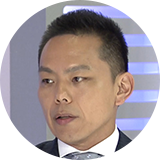
Prime Minister Lee Nak-yon has repeated Seoul's demand that Japan sincerely discuss ways to mend the relationship with South Korea.
He also says South Korea will continue its process of appealing to the World Trade Organization regarding Japan's export controls.
Repercussions for national security
The widening rift between the two countries comes at a sensitive time for security in the region, with North Korea test firing what are believed to be short-range ballistic missiles. Japan's trade actions have prompted a security response from South Korea.
On August 22, Seoul announced that it would end its intelligence-sharing agreement with Japan. The General Security of Military Information Agreement (GSOMIA) was signed in 2016 and automatically renewed each year. It allows either side to pull out after giving notice by August 24.

Tokyo and Washington had been urging Seoul to renew the pact as an important symbol of defense cooperation in the region. Japan's ambassador to South Korea, Yasumasa Nagamine, protested. He told the senior foreign ministry official who notified him of the decision that South Korea was showing a complete misunderstanding of the current security environment.

The US government has also expressed strong concern and disappointment. State Department spokesperson Morgan Ortagus has tweeted that Seoul's decision will make defending South Korea more complicated and increase the risk to US forces.
Heated discussions in Seoul
It appears opinions among officials in Seoul discussing renewal of the pact were split. NHK has learned that the South Korean National Security Council met three hours before the decision was announced. Four of the eight members at the meeting, including the top security officials, wanted the agreement renewed. Three others, believed to be from the president's office, wanted it cancelled.
After a two-hour discussion, President Moon Jae-in and his aides joined the meeting and Moon himself is believed to have made the decision.
Other reasons for halting the pact
Analysts say there are other reasons for Seoul's decision besides the trade spat. First, is the matter of trust.

Deputy chief of the South Korean president's National Security Office, Kim Hyun-chong, says Seoul has made a number of efforts to resolve issues between the two countries. He says Tokyo has damaged their trust by ignoring repeated requests for talks, "deeply hurting" their national dignity and showing a "lack of diplomatic respect."
The move to end the information-sharing pact could also be a way for the Moon administration to deal with problems accumulated over the past nine years of conservative governments. GSOMIA was signed during the previous administration of Park Geun-hye. Moon had indicated during the presidential election campaign two years ago that he could reconsider the pact.
There is also speculation that the Moon administration is strengthening its stand against Japan to steer public attention away from the slowing economy and the scandals surrounding the choice of a new Justice Minister.
Effects of terminating GSOMIA
A high-ranking Japanese government official has said the impact of Seoul ending the pact will be minimal, noting that Japan and the US already have a solid relationship of information-sharing on security.
But some experts say any weakening of the cooperation between the US, Japan and South Korea undermines their ability to respond as a group to regional threats.
Research Director of the Canon Institute for Global Studies, Kuni Miyake, says if two of the group are fighting, there can be no deterrence against North Korean pressure or military aggression.
The day after Seoul notified Tokyo of its decision to withdraw, Pyongyang test-fired what it called a new, "super-large, multiple rocket launcher." Japan's defense minister described the projectiles as a new type of short-range ballistic missile.
Miyake, a former diplomat, suspects other regional powers like China and Russia are gloating over the pending collapse of the GSOMIA.

Trickle-down effects
The deterioration in relations between Tokyo and Seoul are affecting other institutional ties. Japan's Defense Ministry says South Korea's military academy has cancelled a student exchange visit scheduled for the end of August. The program was meant to foster trust between the academies training officers for Japan's Ground Self-Defense Force and the South Korean army.
Japanese and South Korean lawmakers have postponed a meeting of their parliamentary groups next month in Tokyo.
South Korean Prime Minister Lee has said Seoul would reconsider its withdrawal from the pact if Tokyo retracts its delisting of South Korea for streamlined trade. He notes that the two countries have three months to decide, before the pact terminates in November.
But Japan's Trade Minister, Hiroshige Seko, has said the export control review and the intergovernmental agreement on military information-sharing are completely separate issues.
With no sign yet of a breakthrough, the governments of Japan and South Korea need to work harder to find a way around this impasse.

